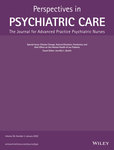Examining the relationship between nurses' fear levels and insomnia during the COVID-19 pandemic in Turkey
Abstract
Purpose
This study was conducted to examine the relationship between nurses' fear levels and their insomnia, influencing sociodemographic factors during the COVID-19 pandemic.
Design and Methods
This study utilized cross-sectional methods and the data were collected between July 15 and August 15, 2020. In the data collection, “Socio-demographic question form,” “Covid-19 Fear Scale,” and “Bergen Insomnia Scale” tools were used. Descriptive statistics, numbers, percentages, independent samples t test, analysis of variance test, and correlation were used on the Statistical Package for Social Science (SPSS) 22.0 package program in evaluating the research data. Ethical approval was obtained from the Ethics Committee of Batman University.
Findings
A positive correlation was found between COVID-19 Fear Scale and the Bergen Insomnia Scale (r = .392; p = .001). The relationship between COVID-19 Fear and Bergen Insomnia Scale score averages and nurses' educational status, income level, shift working status, the status of their relatives being diagnosed with COVID-19, the state of being satisfied with the management of the pandemic process by the Ministry of Health, the situation of having resources in the settings where they work, the status of being in quarantine was statistically significant (p < .05).
Conclusion
The relationship between the nurses' fear levels of COVID-19 and their insomnia levels was moderate.
Practice Implications
The results of this study are important in terms of understanding the nurses' fear and insomnia during the pandemic and provide data support for the proper interventions. Also, nurses working in Turkey may call for more attention and support from policymakers during the COVID-19 pandemic.
CONFLICT OF INTERESTS
The authors declare that there are no conflict of interests.
Open Research
DATA AVAILABILITY STATEMENT
Data are openly available in a public repository that issues data sets with DOIs.




